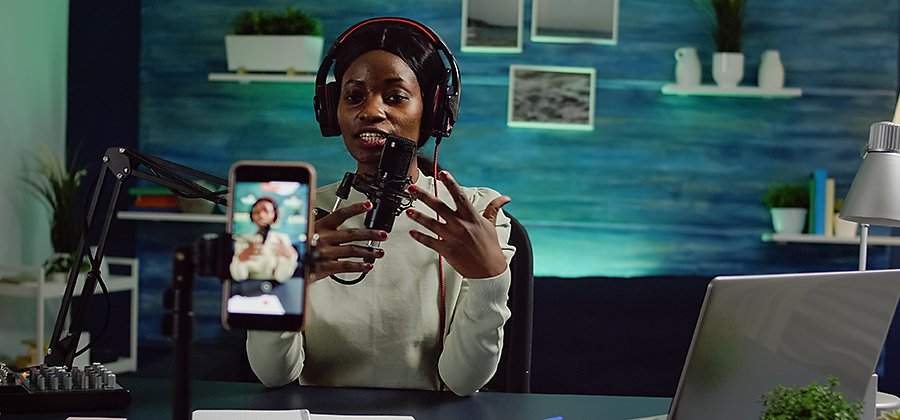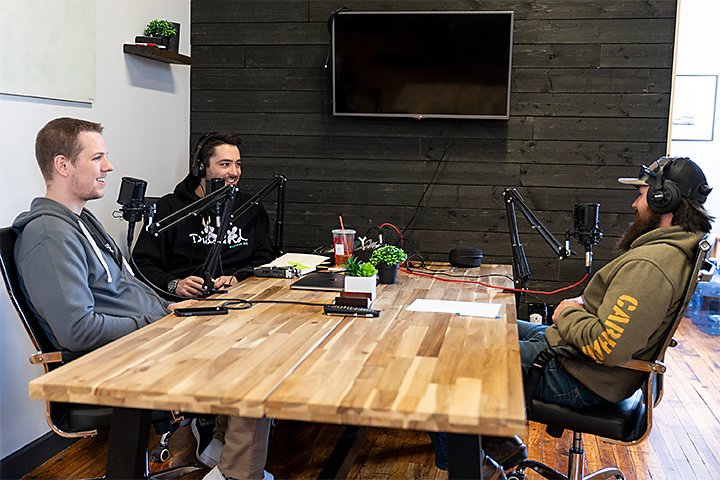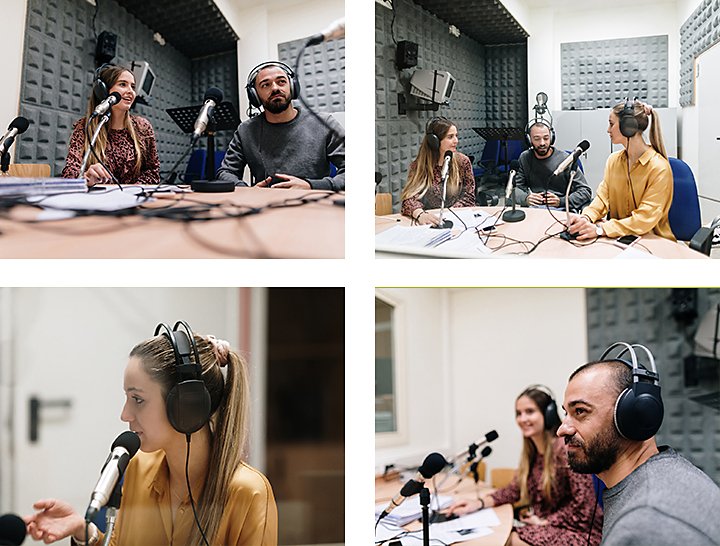Use podcast videos to reach an even wider audience.
Podcasts are an audio medium, but adding a video component can help creators engage with users on platforms and social media beyond the podcast feed.

What is a podcast video?
Podcasts are, first and foremost, about the human voice. Whether a podcast features a single host holding forth on a topic or a panel discussion, the most important aspects are people’s words and ideas. However, communication goes far beyond just words. Hand gestures, facial expressions and body language all play a major role in speech and adding a video element to podcasts can capture that extra nuance and help podcasters surpass simple audio content.
Podcast videos can capture those nuances of communication and also offer podcasters a way to spread their message and reach audiences beyond their usual platforms.
How to create a podcast video.
Because it’s video content, a high-quality video podcast is more labour intensive to create than an audio file for an RSS feed, the standardised format that allows apps like Apple Podcasts, Stitcher and Google Play to all easily read and download episodes.

Image by Focus Forward Media
Record a podcast video.
In podcast videos, the podcast comes first and the video comes second. Prioritise getting good audio. Dedicated microphones are generally better at recording voices than onboard camera mics. However, you don’t need a lot of expensive equipment. “You don’t necessarily need the best cameras,” says Mike Neilan, a podcaster with Focus Forward Media. “The point of a podcast is the storytelling. You don’t need a camera that shoots 4K. Get a solid $100 microphone.”
If you’re filming a remote interview, you sometimes won’t be able to get your guests on camera. They might not have a webcam or they might have to call in from another location. If so, you still need something visual when they’re speaking and don’t settle on just a static image. The animated waveform of their speech over a headshot or logo will still add a dynamic visual element to the video footage.
“We wanted to figure out the actual podcast before we added video into the mix,” says Neilan. Focus Forward made sure their podcast worked and their audio was clean before adding in the visual element. Visuals are important, but it’s your words, ideas and conversation that are going to draw in the audience. When you make a podcast video, always remember what makes for a good podcast, even if there is no video component. Podcasting basics, like correcting for background noise and editing out slips of the tongue, still apply.
Edit a podcast video.
While it’s usually worthwhile to capture audio and video separately, edit them together. “We record audio separately from video,” says Christina Jones, a podcaster at Creatives Are Essential. “Once we finish recording the podcasts, we sync those up in Adobe Premiere.”
Set up your recording situation to avoid awkward edits. When recording, try to have more than one camera, if possible. If you only have one camera, you’ll have to resort to jump cuts during an audio edit. With multiple angles, you can have the camera cut away during an audio edit, so viewers aren’t subjected to a distracting jump cut. Cuts to B-roll can also help make audio edits less jarring and better help integrate audio and video.

Add in extras.
Once audio and video are edited together, add extras like on-screen text that identifies all of your speakers, lower thirds (i.e., any graphic that appears in the lower third of the screen) and other on-screen graphics. Podcasts can be limited in how they send listeners to advertisers, with calls to action presented as only a request by a podcast host for listeners to take the time to explore other content. With podcast videos, though, on-screen graphics can also be clickable. If the hosts are talking about a website or promoting a product or service, you can build a workable on-screen CTA in the video, removing a little bit of friction for your viewers.
Promote your podcast videos.
Podcast videos can be a promotional tool and can help podcasters go beyond audio.
Know your platforms.
Different platforms have different needs and requirements. YouTube and many other platforms need a customised thumbnail or promotional image for every video uploaded. However, other platforms, like Apple Podcasts or Spotify, only need a single, static promotional image. If you want to effectively engage with an audience on various platforms, you have to tailor your content to the needs of that platform.
Turn one podcast episode into many videos.
A video for a long podcast episode can be edited into shorter, more shareable chunks. While a whole episode might be anywhere from 20 to 90 minutes, some topics might only take a minute or two. If you have segments like that in your podcast, they can be lifted out and turned into shorter videos, which can gain traction on social media platforms.
“By recording the video you can clip it, put it on social and grow your podcast,” says Mike McDonough of Focus Forward Media. Devoted audiences can and will engage with long content, but shorter videos are more shareable and can be a good tool to hook in new subscribers and viewers.
Engage with your guests on their turf.
Getting a well-known guest on your podcast is a tried-and-true way of growing your audience. If you have prominent guests, they’ll promote the podcast on their channels and your audience will be more likely to tune in to your content. Podcast videos afford an even bigger opportunity to take advantage of this well-established method. By making podcast videos, you can engage with video-focused creators on their platform of choice. It’s easier to reach a YouTuber’s audience on YouTube or a TikTok star’s fans on TikTok. You don’t have to try to redirect a video-focused audience to an audio medium.
Go further than the usual podcast format.
The most popular podcasts have millions of subscribers and podcast listeners often feel powerful connections to their favourite shows and hosts. However, breaking into that market can be difficult. There are a lot of podcasts, all competing for attention and listeners.
To get that attention, creators have to put themselves out there on all channels and video is an effective way to do that. It’s also a way to invest even more of yourself and your personality into the podcast. Audiences don’t just tune in for what you’re saying. They listen because they want to hear from you. Putting yourself in front of the camera is an effective way to do that and every step matters in creating that all-important bond with your audience. “Be yourself,” says McDonough. “At the end of the day, you have to be who you are.”
Contributors
Do more with Adobe Premiere Pro.
Make visually stunning videos virtually anywhere — for film, TV and web.
You might also be interested in…
Setting up a home recording studio.
Explore the basics of creating a space at home to capture high-quality audio.
Los mejores tipos de archivo de formato de audio.
¿Con o sin pérdida de datos? ¿Comprimido o sin comprimir? Encuentra el formato de audio que encaja con tus necesidades.
Finding the best DAW for your audio needs.
Learn how to select a music or podcast mixing platform to meet.
Learn how to add audio to your videos to bring energy to music videos, clips and more.
Obtén Adobe Premiere Pro
Puedes crear producciones perfectas con el software de edición de video líder en su sector.
7 días gratis, luego Ar$ 13.491,50 /mes.



